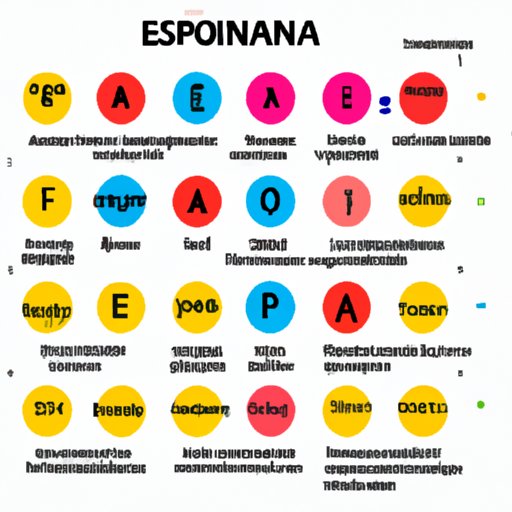
Introduction: Exploring the Essentials of Saying Where You Are From in Spanish
If you’re planning a trip to a Spanish-speaking country or just want to become more familiar with the language, it’s essential to know how to say where you are from in Spanish. Fortunately, this is a relatively easy concept to master, even if you are a beginning Spanish learner. In this article, we will explore the basics of telling others where you are from in Spanish, as well as some tips and tricks for mastering the language. Read on to learn how to introduce yourself and your location, give directions with confidence, understand nouns and verbs for describing your origin, and more.
An Easy Guide to Locating Yourself in Spanish
When meeting someone new, it’s important to let them know where you are from. In Spanish, this can be done by simply stating the name of your home country, state, or city. To make the process even easier, there are some basic Spanish phrases that you can use to introduce yourself and your location. Here are a few examples:
- Soy de los Estados Unidos. – I am from the United States.
- Vengo de California. – I come from California.
- Mi hogar está en Nueva York. – My home is in New York.
When trying to remember your origin in Spanish, it can help to practice speaking out loud and writing down the words. This will help you get used to the pronunciation and spelling of the words and phrases associated with where you are from. Additionally, it’s a good idea to become familiar with the geography of Spanish-speaking countries. This will help you identify the names of states and cities when you are speaking to someone.
Giving Directions with Confidence: How to Express Where You are From in Spanish
Once you have mastered the basics of introducing yourself and your location in Spanish, it’s time to move on to expressing where you are from using prepositions. Prepositions are words that indicate direction, such as “en” (in) and “de” (from). Here are some examples of how to use prepositions to describe your location in Spanish:
- Estoy en España. – I am in Spain.
- Vengo de México. – I come from Mexico.
- Vivo en Colombia. – I live in Colombia.
In addition to using prepositions, you can also make connections by describing where you are from in Spanish. For example, you could say, “Yo soy de Madrid, que está en España.” (I am from Madrid, which is in Spain.). This will help you establish a connection between your home country and the place you are currently visiting.

The Basics of Saying Where You are From in Spanish
In order to say where you are from in Spanish, it’s important to understand some of the basic building blocks of the language. This includes nouns, adjectives, and verbs. Nouns are objects, such as countries, states, and cities. Adjectives are descriptive words, such as “grande” (big) and “pequeño” (small). Verbs are action words, such as “hablar” (to speak) and “escuchar” (to listen). By learning these fundamentals, you can easily construct sentences about where you are from in Spanish.
Another important element of saying where you are from in Spanish is understanding the sentence structures for forming questions about your origin. For example, if someone asked you, “¿De dónde eres?” (Where are you from?), you would answer with the name of your home country, state, or city. Additionally, you can ask someone else the same question by saying, “¿De dónde eres tú?” (Where are you from?).

Learn the Lingo: How to Identify Your Origin in Spanish
Now that you know how to construct sentences about where you are from in Spanish, it’s time to learn the right words to use when talking about your home country. Knowing the correct terms for identifying your origin can help you make a good impression when speaking to native Spanish speakers. Here are a few common Spanish sayings related to where you are from:
- Mi país natal es… – My native country is…
- Yo vengo de… – I come from…
- Yo soy de… – I am from…
It’s also helpful to learn the names of countries, states, and cities in Spanish. This will make it easier for you to identify your origin when speaking to someone. Additionally, familiarizing yourself with the geography of Spanish-speaking countries will help you understand their culture and customs.
A Beginner’s Guide to Telling Others Where You are From in Spanish
Once you have mastered the basics of saying where you are from in Spanish, it’s time to focus on improving your pronunciation and fluency. This can be done by practicing speaking with native Spanish speakers or by listening to recordings of conversations in Spanish. Additionally, if you are a visual learner, you can watch videos or movies in Spanish to help you gain a better understanding of the language.
Finally, it’s important to remember that learning a language takes time and patience. Don’t be discouraged if you don’t master the language overnight. With practice and dedication, you will soon be able to tell others where you are from in Spanish with ease.
Conclusion: Summarizing the Key Points of Saying Where You are From in Spanish
By following the steps outlined in this article, you can easily learn how to say where you are from in Spanish. Start by mastering the basics of introducing yourself and your location, then move on to expressing where you are from using prepositions. Additionally, understanding nouns, adjectives, and verbs for describing your origin is essential. Finally, practice speaking with native Spanish speakers and focus on improving your pronunciation and fluency. With dedication and hard work, you will soon be able to identify your origin in Spanish with ease.
(Note: Is this article not meeting your expectations? Do you have knowledge or insights to share? Unlock new opportunities and expand your reach by joining our authors team. Click Registration to join us and share your expertise with our readers.)
